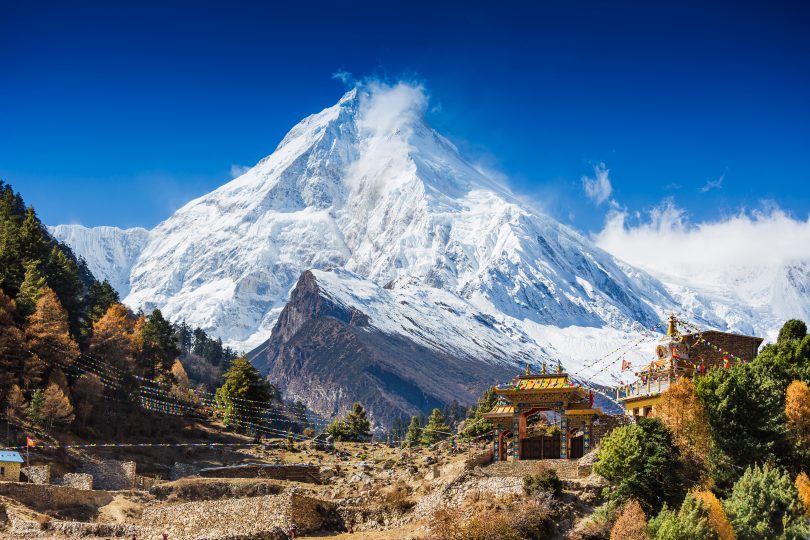From a cannabis heaven in the 60’s and 70’s to a restricted country after caving to international pressure, Nepal has some interesting cannabis laws, and might be looking at some substantial updates toward legalization in the near future.
Nepal is a landlocked country in Asia surrounded mainly by India from three sides, and Tibet from the north. It’s a very small country land-wise, stretching approximately 500 miles East to West, and ranges from 90-150 miles going north to south. Nepal was finally established as a democratic republic after a period of upheaval and violence due to a Maoist insurgency.
Due to its location, being stuck in an isolated zone between two big countries, Nepal was essentially left to its own devices, and didn’t reach the development level of other countries. As an interesting point, the population of Nepal is very young with 60% under the age of 30, and 80% under the age of 45. This is not an indication of a very low life expectancy, as both males and females live on average until at least 70.
Click HERE to subscribe to the CBD Flowers Weekly Newsletter to access our top-shelf flower deals!
Nepal’s sordid cannabis history
In the 60’s and 70’s, not only was cannabis legal in Nepal, but Nepal itself, being a part of the notorious “Hippie Trail”, was a huge bastion of hippy antics and open marijuana smoking. The Hippie Trail was a land trail that could be cheaply traveled to get to Asia from Europe via Turkey, Iran, Afghanistan, Pakistan, Nepal, and India.
It ended in Katmandu where the infamous Freak Street acted as the culmination of open smoking culture in Nepal, a hippie hideout not so different from Freetown Christiana in Denmark’s Copenhagen. This brought a lot of traffic through Nepal, and fueled its already abundant subculture of cannabis smoking. Cannabis smoking has always been a large part of Nepalese culture, in a religious capacity, medicinal, and recreational as well.
By 1972 Nepal was one of the biggest hash exporting countries, but this came to an end in 1973 when Nepal updated its laws after being pressured by the US and UN. In July of 1973 all shops were closed and all growing licenses cancelled. This had a major impact on the GDP of the country which was reliant on the cannabis industry.
Nepal cannabis laws today
In 1973, cannabis was reclassified as a narcotic drug, and made illegal in a place where it had enjoyed considerable use and freedom prior. Freak Street dealers were deported, and all above-board cannabis operations stopped. However, it wasn’t the blanket illegalization seen in some places. Through the Narcotics Drug (Control) Act, it became illegal to buy it, grow it, or prepare it in any way. This strange discrepancy is seen frequently where laws don’t match up. According to the laws it is legal to use it, but illegal to buy or grow it.
Even more inconsistent than that, the same law goes on to state that a person found using cannabis will be subject to a short prison sentence (about a month), or a fine (somewhere around 2,000 rupees). Agreeing to treatment options can get an offender’s sentence waived, as can dealing with a Nepalese official who decides to waive punishment as is their prerogative to do, especially in first-time offence cases, or concerning small amounts, so long as the offender signs an agreement saying they will not offend again.
The problem with little specification in a law is that it can be interpreted different ways. There are also reports of offenders being subject to years long prison sentences for being found with small amounts. As there is a large cannabis culture in Nepal still, cannabis use is often treated with a blind eye by officials and not responded to at all.
Cannabis Laws By State: A Quick Guide For Your Reference
Supply crimes are illegal in Nepal, however it continues to be a large producer of hash both for domestic and international markets. If you’re caught smuggling cannabis in Nepal, you could be put in prison without a trial until you have enough to pay to get out. Bribes are frequently used, but if used on the wrong official, could end up increasing prison time.
The Narcotic Drugs Control Act states: If caught supplying up to 50 grams, an offender is looking at three months in prison and ~ 3,000 rupee fine. At the other end, being caught with a supply load of 10 kg or more, an offender is looking at 2-10 years imprisonment and 15,000-100,000 rupee fine.
In terms of being caught growing, an offender caught with up to 25 plants will face about three months in jail or pay a 3,000 rupee fine. For over 25 plants, the jail time is the same, but the possible fine increases from 5,000-25,000 rupees.
What about CBD and medical use?
Nepal’s laws do not differentiate between cannabis and cannabinoids, so CBD is illegal. Any extract or essence of the plant is illegal to buy, sell, make, or use.
There is also no medical program in Nepal, even though the country has a strong tradition of Ayurvedic medicine.
BUT, it all goes out the window FOR ONE DAY
Yup, for one day a year, you can forget everything you thought you knew about Nepalese cannabis law. The Mahashivaratri Festival is a yearly festival in Hindu culture, which is the predominant culture of Nepal. Mahashivaratri is in deference to the goddess Shiva. General sacred days for Shive include the 14th day in the dark half of a lunar month. When that 14th day falls in the month of Magha, which is in January or February of the Gregorian calendar, it becomes the Mahashivaratri Festival, which is the most important day of the year in Nepal.
The day before is a fasting day with a night ceremony. Then on Mahashivaratri, the festivities occur with big feasts, fairs, parties, overall celebrations, and the legal smoking of cannabis. While cannabis is legal on that day for religious use by religious people in temples (actually supplied by the government until the 1990’s when the practice became frowned upon for what are probably obvious reasons of it being weird for a government to be the provider of a drug it illegalized), it has become more widespread, with people smoking in the streets.
Legalized Religiously – How Rastafari Tradition Is Helping Ease Cannabis Regulation in the Caribbean
Full legalization to come?
It’s not shocking these days for poorer countries to see the benefit of growing cannabis as part of the global medical cannabis industry, and Nepal is no different.
The ruling party in Nepal is the Communist party, and it along with ~47 other legislators from various parties have come together to push a new bill for legalization in order to boost the economy. If the legislation is passed, it would mean decriminalizing the use, sale, and production, all of which had been outlawed in the 70’s. The new bill would require private growers to gain licensing from the government or face a one-year jail sentence. Commercial farming would be promoted with licensing given to adults 18 and above, although no information has been given yet on how steep the licensing fee would be, or if it would be meant for local farmers or foreign investors.
Households would be able to grow up to six plants if the legislation passes, so long as the cannabis is not sold or provided to anyone under 21 or who is pregnant.
“The main reason behind registering the bill to legalize the cultivation and sales of cannabis is that it has proved to be a medicinal plant and it can also contribute to increasing income of Nepali farmers massively”, stated Sher Bahadur Tamang, a Nepalese legislator, and former law minister. The bill is called the Cannabis Farming (Management) Act. As of yet, it is still in the pipeline and nothing has been passed.
Conclusion
There’s definitely something satisfying about seeing a country that was forced into cannabis illegalization (as Nepal was), regain its autonomy, history, and culture. If the new legislation doesn’t pass, the Nepalese will have to be happy with the Mahashivaratri festival for now, but if it does pass, not only will it bring Nepal into the modern global medicinal cannabis market, it will also undue repressive laws that should never have been passed in the first place.
Thanks for stopping by CBD TESTERS, your hub for all things cannabis-related. Stop by regularly and make sure to subscribe to the Medical Cannabis Weekly Newsletter to keep up-to-date on all the most interesting industry topics.







